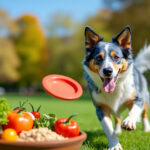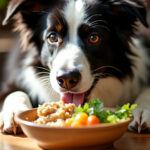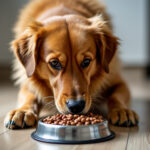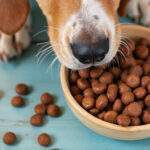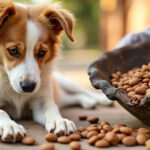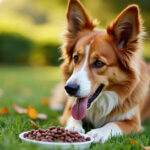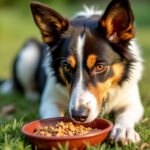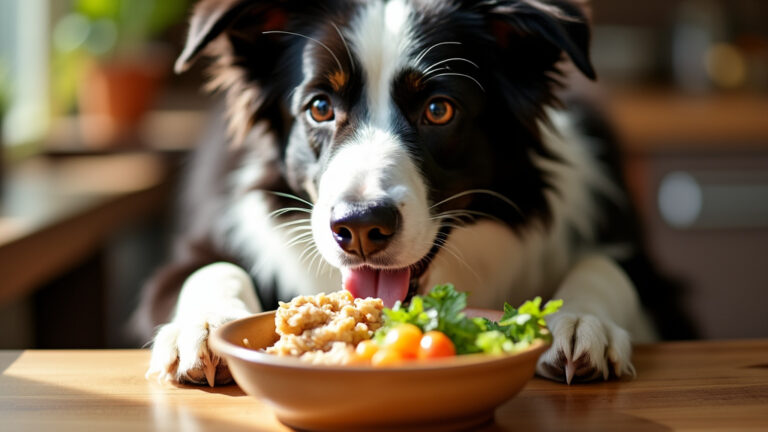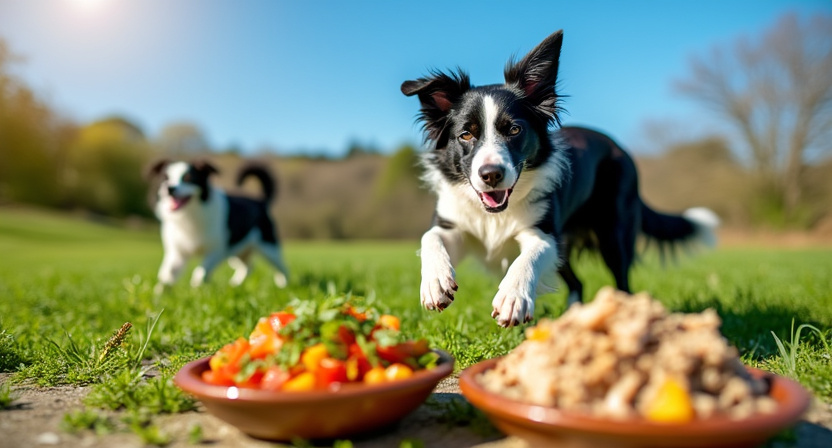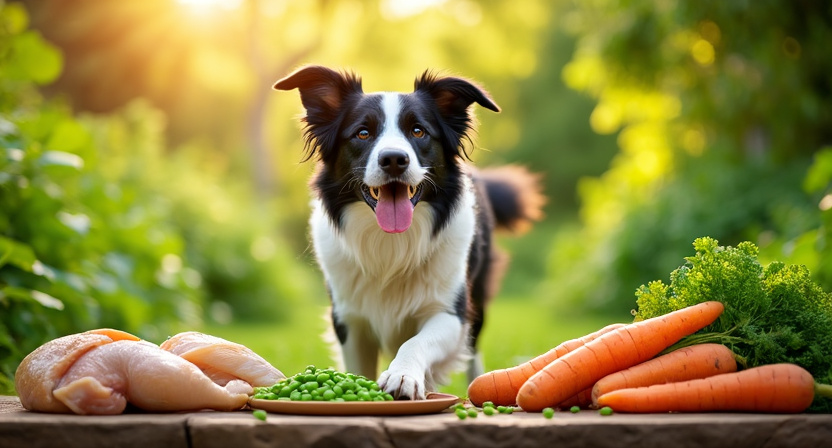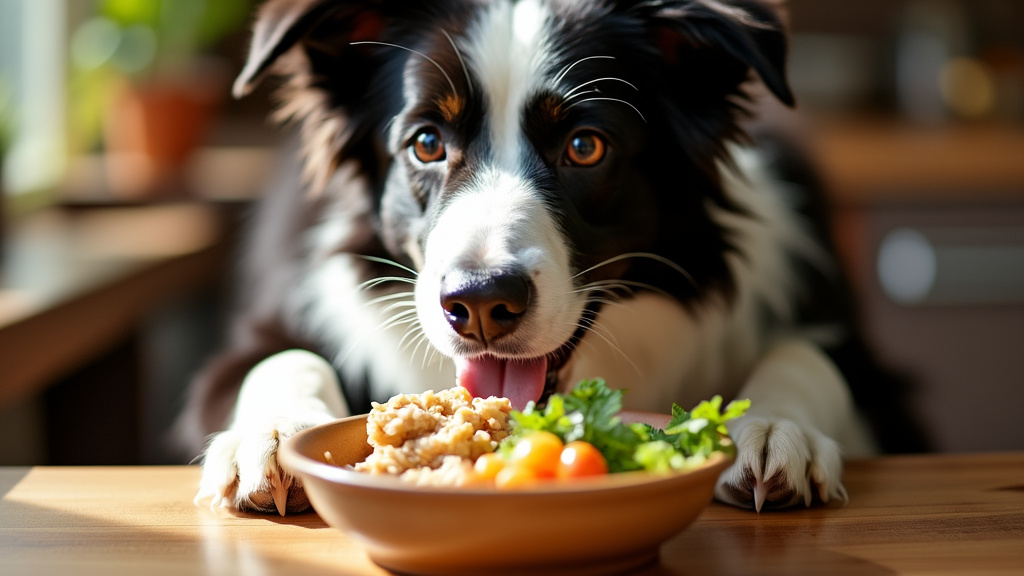Border Collies need a nutrient-packed diet with top-quality proteins to fuel their active lifestyle and keep them in peak condition. Their meals should include essential fats, complex carbs, and a balanced mix of vitamins and minerals. Aim for 25-30% protein and 15-20% fat in their daily intake.
Table of Contents
ToggleKey takeaways:
- Premium protein sources are vital for maintaining lean muscle and overall well-being in Border Collies.
- Omega-3 and Omega-6 fatty acids boost brain function and promote a healthy coat.
- Complex carbohydrates deliver steady energy without causing quick spikes in blood sugar.
- Careful portion control and regular weight checks help maintain a healthy body condition.
- Border Collie puppies need specialized nutrition with higher protein and fat levels to support their rapid growth phase.
Nutritional Requirements for Border Collies: High-Energy, Protein-Rich Diet
Border Collies are dynamos, requiring a nutrient-packed diet to fuel their boundless energy. I’ve found that high-quality proteins are the cornerstone of their nutrition, supporting lean muscle mass and overall health. Real meat sources like chicken, beef, or fish should top the ingredient list in their food.
Essential Fats and Carbohydrates
These active pups also benefit from essential fats, particularly Omega-3 and Omega-6. These fats aren’t just for energy; they’re crucial for brain function and maintaining a glossy coat. I recommend looking for foods that include fish oil or flaxseed as sources of these beneficial fats.
For sustained energy, complex carbohydrates are key. Sweet potatoes, brown rice, and oats are excellent options that provide lasting fuel without the rapid spikes in blood sugar associated with simple carbs. I suggest steering clear of foods heavy in simple carbohydrates to prevent unwanted weight gain.
Balancing the Diet
A well-balanced diet for Border Collies should include:
- High-quality protein sources (25-30% of diet)
- Moderate fat content (15-20%)
- Limited, complex carbohydrates (under 30%)
- Essential vitamins and minerals
By focusing on these nutritional pillars, you’ll help ensure your Border Collie maintains optimal health and energy levels for their active lifestyle.
Top Dog Food Brands for Border Collies
High-Protein Options for Active Dogs
I’ve found several excellent dog food brands that cater to Border Collies’ nutritional needs. Acana Highest Protein stands out with its impressive 35% crude protein content, making it perfect for working Border Collies who need extra energy. For growing pups, Merrick Puppy Plate offers a protein-rich formula with 96% of its content coming from beef or poultry sources.
If you’re looking for a more budget-friendly option without compromising on quality, American Journey Protein and Grains provides a solid 25% crude protein content. This brand strikes a good balance between nutrition and affordability.
For Border Collies with sensitive stomachs, Purina Pro Plan is a reliable choice. It’s formulated to support digestive health while maintaining high nutritional standards.
When selecting the best food for your Border Collie, consider these key factors:
- Protein content: Aim for at least 25% for adults, higher for working dogs
- Ingredient quality: Look for whole meat sources as the first ingredient
- Digestibility: Choose brands known for easy digestion
- Age-specific formulas: Puppies and seniors have different nutritional needs
By focusing on these aspects, you’ll ensure your Border Collie gets the nutrition they need to thrive.
Feeding Guidelines and Considerations
Tailoring Portions for Your Border Collie
I recommend feeding adult Border Collies 2-3 cups of dry food daily, split into two meals. This approach helps maintain their energy levels and supports digestive health. For puppies, it’s crucial to provide up to 1,400 calories daily, spread across frequent small meals to fuel their rapid growth and development.
Weight management is key for Border Collies, especially as they age. I suggest regularly monitoring your dog’s weight and adjusting portions accordingly to prevent obesity. Senior dogs often require fewer calories, so be prepared to modify their diet as they enter their golden years.
When introducing new food, I advise a gradual transition over a week or more. This method helps avoid digestive upset and ensures your Border Collie adapts smoothly to the change. Here’s a simple transition plan:
- Days 1-2: 75% old food, 25% new food
- Days 3-4: 50% old food, 50% new food
- Days 5-6: 25% old food, 75% new food
- Day 7 onwards: 100% new food
Lastly, don’t overlook the benefits of wet food. It can boost hydration and appeal to picky eaters. I suggest mixing a small amount with dry kibble to enhance palatability and nutritional variety in your Border Collie’s diet.
Special Dietary Needs and Health Considerations
Tailoring Nutrition for Border Collies
Border Collies with grain sensitivities can benefit from grain-free dog food options. These formulas replace traditional grains with alternative carbohydrate sources, supporting digestive health. For weight management, I recommend incorporating low-calorie treats into their diet. Carrots and apple slices are excellent choices that satisfy cravings without adding excessive calories.
To boost nutrition, consider adding supplements to your Border Collie’s meals:
- Bone broth for joint health
- Omega oil for coat and skin health
- Plain Greek yogurt for digestive support
For Border Collies with specific health conditions like hip dysplasia or epilepsy, dietary adjustments can make a significant difference. I always advise consulting with a veterinarian to create a customized nutrition plan. They can recommend precise dietary modifications that address your dog’s unique health needs.
Remember, every Border Collie is different. What works for one may not suit another. By paying attention to your dog’s individual needs and working closely with your vet, you can ensure your Border Collie receives the best possible nutrition for their health and well-being.
Puppy Nutrition: Supporting Rapid Growth and Development
High-Quality Protein and Fat for Growing Pups
Border Collie puppies need a diet rich in protein and fat to fuel their rapid growth. I recommend choosing puppy formulas specifically designed for growth and development. These foods typically contain higher levels of essential nutrients to support your pup’s expanding body and mind.
Key Nutrients for Cognitive Development
DHA, an omega-3 fatty acid, plays a crucial role in cognitive development. It’s found in high-quality puppy foods like Merrick Puppy Plate. This nutrient helps ensure your Border Collie grows into the intelligent, trainable companion they’re known to be.
To support your puppy’s energy needs and growth, I suggest feeding frequent small meals throughout the day. This approach helps maintain steady blood sugar levels and provides consistent fuel for their active lifestyle.
Here are some key factors to consider when selecting puppy food:
- High-quality protein sources (like chicken or fish)
- Healthy fats for energy and coat health
- Added DHA for brain development
- Balanced calcium and phosphorus for bone growth
- Probiotics for digestive health
By focusing on these nutritional elements, you’ll give your Border Collie puppy the best start in life, setting them up for a healthy and active future.
Maintaining a Healthy Diet: Tips and Best Practices
Balancing Nutrition and Portion Control
I recommend mixing dry and wet food to provide a range of nutrients for your Border Collie. This combo ensures they get the best of both worlds: crunchy kibble for dental health and moist food for hydration. Treats should be given sparingly, making up no more than 10% of their daily calories. It’s crucial to adjust serving sizes based on your dog’s activity level and health status. Active Border Collies need more fuel, while less active ones require smaller portions to prevent weight gain. Here are key points to remember:
- Combine dry and wet food for varied nutrition
- Limit treats to 10% of daily calorie intake
- Adjust portions based on activity and health
- Schedule regular vet check-ups to assess nutritional needs
- Watch for signs of food sensitivities or obesity
Sources:
Ultimate Border Collie
Wag Walking
American Natural Premium
Burgess Pet Care
Frequently Asked Questions
What are the key nutritional requirements for Border Collies?
Border Collies require a high-energy, protein-rich diet. Their diet should include high-quality proteins (25-30%), moderate fat content (15-20%), limited complex carbohydrates (under 30%), and essential vitamins and minerals.
How much food should I feed my adult Border Collie?
Adult Border Collies typically need 2-3 cups of dry food daily, split into two meals. However, portions should be adjusted based on the dog’s activity level and weight.
What are some top dog food brands for Border Collies?
Some excellent options include Acana Highest Protein, Merrick Puppy Plate, American Journey Protein and Grains, and Purina Pro Plan. These brands offer high-protein formulas suitable for Border Collies’ nutritional needs.
How should I transition my Border Collie to a new food?
Introduce new food gradually over a week or more. Start with 75% old food and 25% new food, gradually increasing the proportion of new food every couple of days until you reach 100% new food.
Are grain-free diets recommended for Border Collies?
Grain-free diets can benefit Border Collies with grain sensitivities. However, it’s best to consult with a veterinarian before making significant dietary changes.
What nutrients are important for Border Collie puppies?
Border Collie puppies need a diet rich in high-quality protein and fat, with added DHA for cognitive development. Look for puppy formulas specifically designed for growth and development.
How often should I feed my Border Collie puppy?
Puppies should be fed frequent small meals throughout the day to support their rapid growth and maintain steady energy levels.
Can I mix wet and dry food for my Border Collie?
Yes, mixing dry and wet food can provide a range of nutrients, combining the dental benefits of kibble with the hydration benefits of wet food.
